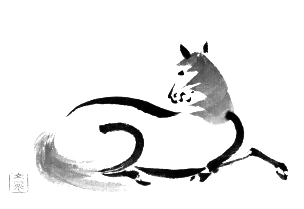This is one of my very favorite folktales. This Chineese tale is meant to exemplify the nature of Taoism (Daoism). It reminds me of the book of Ecclesiastes from the Old Testament of the Bible, or the Jewish Bible (the Tanakh).
A man who lived on the northern frontier of China was skilled in interpreting events. One day, for no reason, his horse ran away to the nomads across the border. Everyone tried to console him, but his father said, “What makes you so sure this isn’t a blessing?”
Some months later his horse returned, bringing a splendid nomad stallion. Everyone congratulated him, but his father said, “What makes you so sure this isn’t a disaster?” Their household was richer by a fine horse, which his son loved to ride.
One day he fell and broke his hip. Everyone tried to console him, but his father said, “What makes you so sure this isn’t a blessing?”
A year later the nomads came in force across the border, and every able-bodied man took his bow and went into battle. The Chinese frontiersmen lost nine of every ten men. Only because the son was lame did the father and son survive to take care of each other.
Truly, blessing turns to disaster, and disaster to blessing: the changes have no end, nor can the mystery be fathomed.
In the book of Ecclesiastes there are several passages that resemble the story of the Taoist Farmer. I decided to present the entire first chapter to give an example of the language and style of the book.
Ecclesiastes 1King James Version (KJV)
1 The words of the Preacher, the son of David, king in Jerusalem.
2 Vanity of vanities, saith the Preacher, vanity of vanities; all is vanity.
3 What profit hath a man of all his labour which he taketh under the sun?
4 One generation passeth away, and another generation cometh: but the earth abideth for ever.
5 The sun also ariseth, and the sun goeth down, and hasteth to his place where he arose.
6 The wind goeth toward the south, and turneth about unto the north; it whirleth about continually, and the wind returneth again according to his circuits.
7 All the rivers run into the sea; yet the sea is not full; unto the place from whence the rivers come, thither they return again.
8 All things are full of labour; man cannot utter it: the eye is not satisfied with seeing, nor the ear filled with hearing.
9 The thing that hath been, it is that which shall be; and that which is done is that which shall be done: and there is no new thing under the sun.
10 Is there any thing whereof it may be said, See, this is new? it hath been already of old time, which was before us.
11 There is no remembrance of former things; neither shall there be any remembrance of things that are to come with those that shall come after.
12 I the Preacher was king over Israel in Jerusalem.
13 And I gave my heart to seek and search out by wisdom concerning all things that are done under heaven: this sore travail hath God given to the sons of man to be exercised therewith.
14 I have seen all the works that are done under the sun; and, behold, all is vanity and vexation of spirit.
15 That which is crooked cannot be made straight: and that which is wanting cannot be numbered.
16 I communed with mine own heart, saying, Lo, I am come to great estate, and have gotten more wisdom than all they that have been before me in Jerusalem: yea, my heart had great experience of wisdom and knowledge.
17 And I gave my heart to know wisdom, and to know madness and folly: I perceived that this also is vexation of spirit.
18 For in much wisdom is much grief: and he that increaseth knowledge increaseth sorrow
The narrative voice of the book of Ecclesiastes is not intended to sound derogatory, apathetic, or complaining. It is meant to elicit in the reader a desire for the eternity of divinity and God himself, while simultaneously expressing the futility of earthly achievement. In chapter 8 of Ecclesiastes we are given the lines: “When I gave my heart to know wisdom and to see the task which has been done on the earth (even though one should never sleep day or night), and I saw every work of God, I concluded that man cannot discover the work which has been done under the sun. Even though man should seek laboriously, he will not discover; and though the wise man should say, “I know,” he cannot discover.” This very same sentiment echoes throughout the Taoist Farmer story, when at the end, we are left with the line: “Truly, blessing turns to disaster, and disaster to blessing: the changes have no end, nor can the mystery be fathomed.”
In what ways are the Taoist Farmer story and the book of Ecclesiastes similar, and in what ways do the differ? Are the texts truthful, with the intention of directing the human gaze toward lasting joy? Or are they disparaging life?
